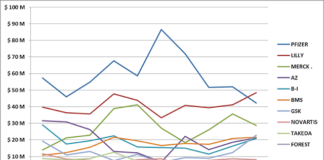The European Parliament has called on the pharmaceutical industry to play a role in finding a solution to halt the rapid decline of the honey bee (see “Can Big Pharma Halt Honey Bee Decline?“). There may even be(e) monetary incentives in the works for any drug company that agrees to develop new medicinal products designed to combat bee diseases.
Merck, which famously uses a honey bee as its Nasonex drug icon (see left) and which is famous for developing vaccines, should be(e) the first to step forward, support this resolution, and announce it is willing to take on the challenge, IMHO. Provided, of course, it gets a major share of those monetary incentives!
Think of the possibilities!
First, Merck would earn the undying love of Europeans facing economic disaster should its honey bee population disappear; did you know that “Albert Einstein once said that without bees, man would live no more than four years”? Thus spoke Hungarian Socialist Csaba Tabajdi, who drafted the resolution.
Whaaa?? A socialist wants to give the capitalist drug industry monetary incentives? This bee problem must really be(e) serious! However, given Europe’s current man-made financial crisis, many Europeans may have fewer than 4 years left regardless of the fate of honey bees.
Second, Merck is committed to animal health: “Our Animal Health business is an industry leader and delivered strong revenue growth in 2010 in both companion and production animals, as well as all geographic regions. Merck remains committed to the animal health business and the diversification it brings. We intend to continue to capitalize on growth opportunities in our broad and innovative portfolio” (2010 Annual Report).
Third, imagine the direct-to-consumer (DTC) marketing opportunities should Merck launch a full-bore attack on honey-bee-disease-causing agents that threaten every honey bee, INCLUDING Merck’s famous Nasonex icon. I’m thinking that Merck can use that icon to promote its efforts to save the honey bee. It can use Twitter to reach out to Europeans (but, of course, NOT the branded fake @Nasonex_Bee account). I’m also thinking that this non-branded DTC effort would not violate EU restrictions on promoting brand drugs to consumers.
Merck would have an easy time convincing EU parliamentarians to approve laws REQUIRING all flowering-plant farmers to use the Merck anti-honey-bee-disease-causing agent vaccine or whatever. Heck, it could extend the law to require ALL farmers — even those who grow crops that do NOT require honey bees for pollination — and even home owners with lawns or other plants, to apply its product. Better yet, the state can take over completely and send out helicopters to spray whole swaths of the countryside!
Of course, you wouldn’t want to eliminate COMPLETELY the honey bee scourge! That would not help Merck “continue to capitalize” on its investment, assuming those government subsidies do not cover 100% of the research and development. You must continue to have high sales to recoup those costs!
One fly (or is it a bee?) in the ointment: part of Merck’s plan to “diversify” may include developing other agricultural products such as pesticides (see, for example, this Merck EPA Application to Register Pesticide Products).
“Research has shown that pesticides made by the pharmaceutical industry are a cause for the weakening of bees. But instead of asking them to stop producing those pesticides, the European Parliament now asks that same industry to develop medicines against the effects of their pesticides,” says Bas Eickhout, Dutch green member of parliament, who presented the house with an alternative resolution asking for a moratorium on the use of harmful pesticides.
Given that 25% of members of the EU Parliament support Eickhout’s resolution, I’d say it’s time for Merck to send to Brussels its lobbyists left over from its push to get U.S. state legislatures to pass bills requiring ALL children to be vaccinated with Gardasil (see “Gardasil: To Be Mandatory or Not To Be Mandatory — That is the Question“)!









![6 Digital Tools at the Center of Healthcare Digitalization [INFOGRAPHIC]](http://ec2-54-175-84-28.compute-1.amazonaws.com/pharma-mkting.com/wp-content/uploads/2021/04/6DigitalTools_600px-100x70.jpg)




